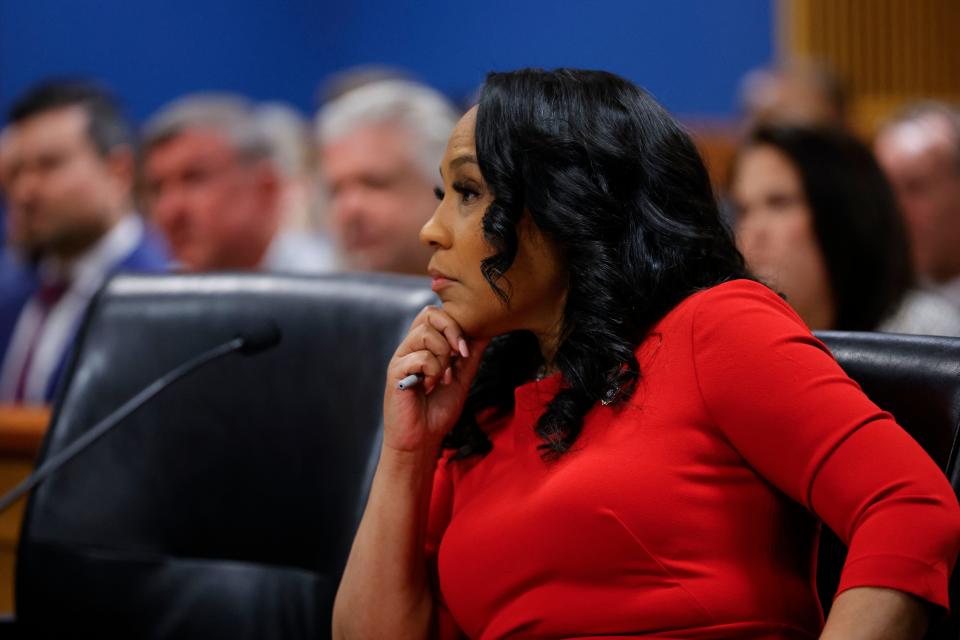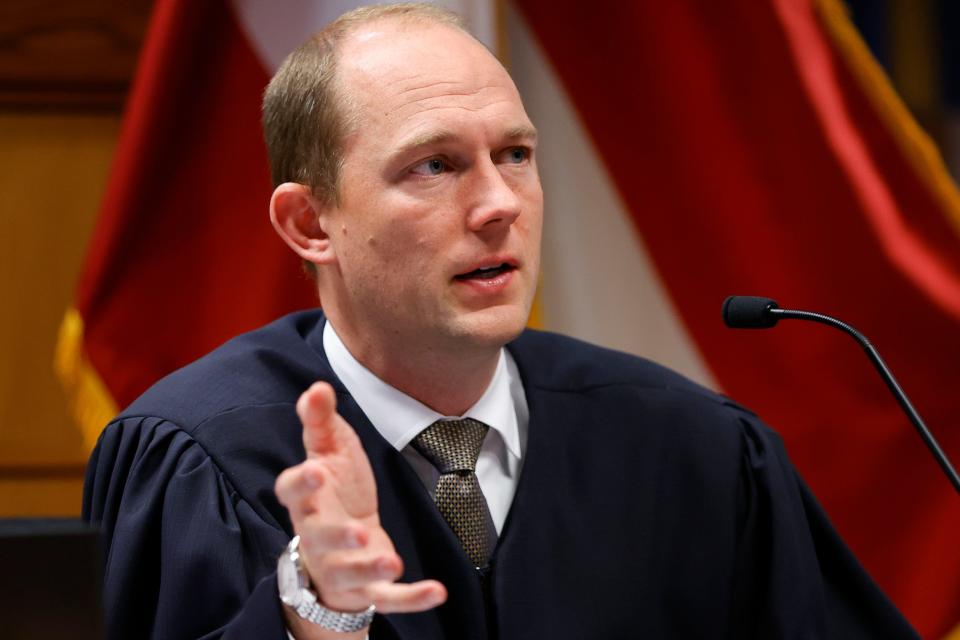Georgia DA Fani Willis fights Donald Trump's appeal to remove her from election interference case
Fulton County District Attorney Fani Willis is fighting former President Donald Trump’s appeal to remove her from his election interference case based on her romantic relationship with another prosecutor.
Fulton County Superior Judge Scott McAfee ruled in March that Willis could remain on the case if special prosecutor Nathan Wade stepped down, which Wade immediately did. Willis and Wade had each testified at a dramatic hearing that she hadn’t benefited financially from hiring Wade, as Trump and other defendants argued.
Trump asked the Georgia Court of Appeals to overturn McAfee’s ruling. But Willis argued in a filing Monday that McAfee correctly found she had no conflict of interest and that she hadn't harmed the case by speaking about it at a church.
“Days of evidence and testimony failed to disclose anything like a calculated pre-trial plan designed to prejudice the defendants or secure their convictions,” Willis wrote in her appeals filing Monday.
The appeals court has 45 days to decide whether to hear the case. McAfee will continue moving the case toward trial, which hasn’t been scheduled.

Why does Trump want to disqualify the Georgia prosecutor?
Trump and 14 co-defendants are charged with a racketeering conspiracy to try to steal the 2020 election from President Joe Biden, who won Georgia. Four other defendants have pleaded guilty, but Trump and the remaining co-defendants have pleaded not guilty.
Trump and eight co-defendants – Rudy Giuliani, Mark Meadows, Jeffrey Clark, Robert Cheeley, Michael Roman, David Shafer, Harrison Floyd, and Cathleen Latham – contend the court of appeals should disqualify Willis from the case. They argue she had a financial stake in the case and had wrongly talked about the case outside court.
Willis and Wade acknowledged a romantic relationship that began after he was hired in November 2021 and has since ended. Trump and others argued that Willis had a conflict of interest because she benefited from hiring Wade through trips they took together. Willis and Wade testified she repaid him for her share in cash.
After the initial filing making the allegations, Willis gave a speech Jan. 14 at at Big Bethel AME Church on the Martin Luther King Jr. holiday weekend questioning whether her adversaries were "playing the race card" by focusing their criticism on Wade, who is Black, rather than two other special prosecutors, who are white. Trump accused Willis of what is called “forensic misconduct” for speaking about the case outside court because it could influence jurors.
“Her disqualification is the minimum that must be done to remove the stain of her legally improper and plainly unethical conduct from the remainder of the case," Trump lawyer Steve Sadow wrote in his appeal. “Her disqualification is necessary to ensure that she cannot continue to violate her heightened ethical obligations as a prosecutor to further prejudice Defendants and this case.”

Judge McAfee refused to disqualify Willis
After a three-day hearing with testimony and arguments, McAfee scolded Willis for "a tremendous lapse in judgment" but let her remain on the case if Wade quit. He did.
"Without sufficient evidence that the District Attorney acquired a personal stake in the prosecution, or that her financial arrangements had any impact on the case, the Defendants’ claims of an actual conflict must be denied," McAfee wrote. "This finding is by no means an indication that the Court condones this tremendous lapse in judgment."
McAfee also ruled that Willis' church speech was "legally improper" but didn't cross the into denying the defendants a fair trial.
"Providing this type of public comment creates dangerous waters for the District Attorney to wade further into," McAfee wrote.
Willis wrote in her filing that McAfee found no conflict of interest and that her church speech didn’t require him to dismiss the charges.
“Ultimately, the trial court found the evidence insufficient to establish any actual conflict of interest and declined to dismiss the indictment,” Willis wrote in her reply to the appeals court. “Given the trial court’s factual findings, which are supported by the record, the trial court correctly ruled the District Attorney did not engage in disqualifying forensic misconduct.”
This article originally appeared on USA TODAY: Georgia DA Fani Willis fights Donald Trump's appeal to disqualify her
